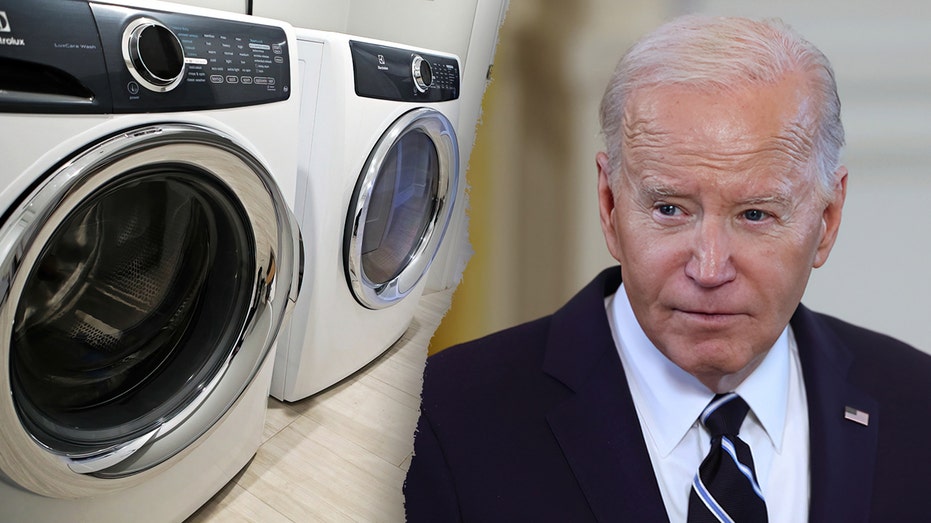Biden’s new energy-saving standards for washing machines and dryers are ‘harmful,’ expert warns
Biden admin approves energy efficiency standards for washers, dryers to take effect in 2028
Biden's attempts to regulate appliances are starting to look like tyranny: Andrew Bailey
Missouri Attorney General Andrew Bailey reacts to a court striking down the president's mandates targeting some household appliances on 'The Bottom Line.'
Gas stoves, pizza ovens, ceiling fans, now washers and dryers, oh my!
Appliances used to clean your clothes are the Biden administration’s newest outlet to advance a renewable energy agenda, according to recently announced Department of Energy regulations which one policy expert described as "skeptical" and "radical."
"These so-called improved efficiency standards do fall in line with them really wanting to pivot towards a net-zero economy and virtually no carbon emissions across the whole of government, too," Independent Women’s Forum Center for Energy and Conservation director Gabriella Hoffman told Fox News Digital.
"Is it going to be achievable? That's debatable, because you won't be able to entirely eliminate it," she continued. "They think that these so-called improved efficiency standards will do that, but there's paradoxes with that."
EXPERTS WARNS GREEN ENERGY PROJECTS ‘ARE NOT WORTH IT’ AS PRICES SPIRAL ‘OUT OF CONTROL’
The Biden-Harris administration recently approved a slew of new energy efficiency standards that include requirements for residential washing and dryer machines.

The Biden administration's latest green energy standards take aim at more household appliances: washers and dryers. (Getty Images)
The Department of Energy (DOE) said in a press release that the washers and dryers will save a reported 3 and 11% of "energy use," respectively, and create approximately $1 trillion in consumer savings over 30 years, saving the average family at least $100 per year through lower utility bills.
It’s also estimated by the DOE that the updated standards will cut 2.5 billion metric tons of greenhouse gas emissions over three decades. The regulations are slated to go into effect by March 2028.
But Hoffman warned the "watered-down" details don’t add up, arguing the rules "incur more costs on people, whether it is the manufacturers and then, ultimately, the manufacturers passing it down to consumers."
"Even in my examination into the final rule, I'd like to know exactly, cost-wise, how much this would cost me eventually if I had to get a new clothes washer, clothes dryer, should mine go out and there's no other model available," Hoffman said.
Biden is working on 'bad regulation' for every appliance in your house: Ben Lieberman
Competitive Enterprise Institute senior fellow Ben Lieberman discusses Biden's plan to target air conditioners on 'Varney & Co.'
Another discrepancy Hoffman noted is that the press release did not clarify what kind of energy source (water, voltage, carbon, etc.) from washers and dryers is impacted.
"Three and 11% are pretty negligible, especially the 3%, across the lifetime of the appliance in question. And it sounds great to those who are advocating this, but I think to the regular person, why would they get rid of, let's say, a clothes washer dryer that uses five gallons [of water]... to pivot towards the 3.2 gallon kind of model?" she posited.
"If you don't see much of a cost difference, people won't see that it really is something that's better, that it's more efficient, that it's going to have less of a negative impact on the environment," Hoffman added. "It just seems like the Biden administration just wants to go after everything and anything. And while the touted benefits may sound good, 3%, 11% is still very negligible. And if you're not seeing the cost match that so-called percentage in savings, I don't think you're going to incentivize consumers to change what they have."
A Department of Energy spokesperson told Fox News Digital in a statement Thursday that the washer and dryer updates "were based on a broad stakeholder-led and achievable consensus that will allow Americans to maintain quality and save money… When you look past the misleading rhetoric, you’ll see that these proposals are intended for nothing more than promoting innovation and increasing energy efficiency without sacrificing the reliability and performance that Americans have come to expect."
Unsure as to which washer and dryer models may face potential U.S. market bans, IWF’s energy director heeded caution for large manufacturers like LG, General Electric, Maytag, Whirlpool and Miele.
"The manufacturers are going to respond and say, ‘Okay, we're given a directive to produce these models,’ and they may have to learn the hard way like electric vehicle or other car manufacturers… their operations are going to be more directly impacted than I would say a car manufacturer sees it… just because of the size and scale… and depending upon if it's a more mom-and-pop type of operation," Hoffman said.
"Could you imagine the demand placed on the manufacturers to have to change their whole kind of output process and production?" she continued. "I think in this regard, the manufacturers will say, ‘We don't see consumers lining up to buy these new appliances. We'll have to reassess doing this, and we can't comply. We don't want to comply with these mandates.’ So I think these manufacturers are more insightful, a little more introspective, and they see that mandates are going to be harmful, and they're not going to be able to meet these unreasonable demands."
A look into Biden's 'dictatorial' war on Americans' appliances: Kudlow
Fox News contributors Douglas Murray and Deroy Murdock react to President Biden's climate agenda targeting home appliances and compare it to China's efforts to tackle climate change on 'Kudlow.'
As more details regarding the washer and dryer standards eventually emerge, Hoffman urged consumers to pay attention to what companies or organizations may financially benefit from efficiency rebates from Biden’s DOE.
"A lot of the people heralding the gas stove prohibitions were full electrification outfits, they were manufacturers who produce models that have moved away from relying on gas. And so you have to look to see which manufacturers potentially or interest groups would benefit from such a change in policy, especially a radical change in policy," she said.
The regulations on washer and dryer efficiency could also be completely reversed if former President Donald Trump were to win presidential re-election this November.
GET FOX BUSINESS ON THE GO BY CLICKING HERE
Maria Bartiromo: The list just got bigger thanks to Biden's war on your appliances
Hovnanian Enterprises CEO Ara Hovnanian says there's 'no question' President Biden's regulations will impact costs for consumers on 'Maria Bartiromo's Wall Street.'
"This is subject to change. The math will certainly be called into question, especially across a 30-year timeline," Hoffman said. "Congress is the one who's supposed to be making these rules or fine-tuning or changing these standards. And so I think people are getting increasingly turned off by the government, especially this White House, crafting these climate policy rules that fall far outside their purview."
"President Biden thinks he's still a senator, that he has to legislate in his capacity," she continued. "I think we're going to see people respond to energy policies that work best for them without having to sacrifice their livelihoods, but also, make it so that they can still live and still enjoy the great outdoors or enjoy nature and not having to pit the interests against one another."
























